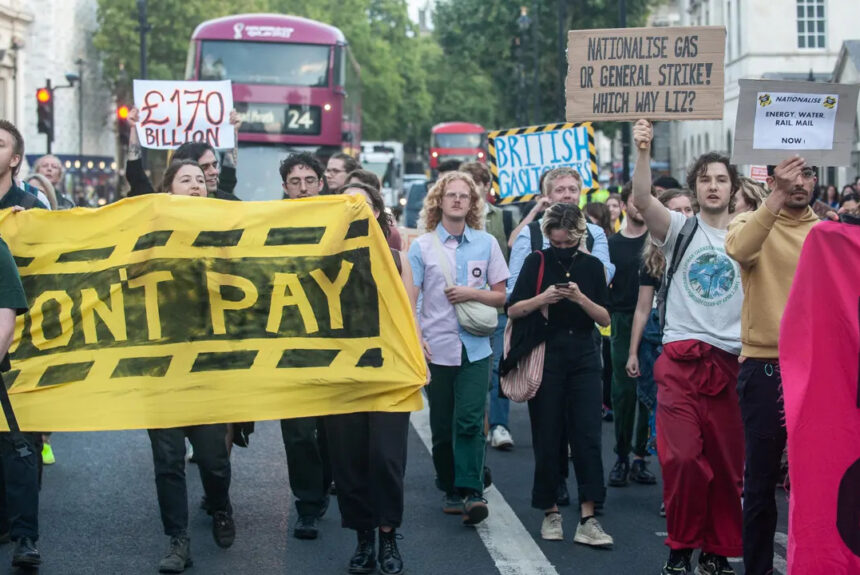Protest group Don’t Pay attempted to convince households to cancel their October bill direct debits en masse. Ten thousand homes a month are forced to switch to more expensive tariffs as they fall behind with payments. Up to 1.7 million households were anticipated to participate — but consumer choice experts advised against it, warning they would incur pricier rates, debt collection fines, and energy cut-offs. Performative protests won’t help households struggling with the cost of living. Only by ending the arms race between suppliers and consumers caused by price caps, and repatriating reliable energy manufacturing, can regulators end this civil unrest.
>>>READ: Bad Climate Policies are a Clear and Present Danger
Thirty Greenpeace activists invaded Parliament to stage a sit-in, following the appointment of Rishi Sunak as prime Minister. Just Stop Oil — Britain’s newest activist organisation causing criminal damage and blocking highways — threw tinned soup at Van Gough’s Sunflowers in London’s National Gallery. Activists climbed the 275 foot masts on the Queen Elizabeth II Bridge, and tethered themselves to its steel cables, halting all traffic that day. Due to resulting ambulance response time delays, two women died from their injuries after a car crash.
All of this was done in the name of the complete decarbonisation of the UK’s energy grid. But despite what ideological struggle-sessions have convinced these activists, their dogmatic insistence on a renewables-only approach will not help the 7.8 million British households set to struggle paying their energy bills this winter.
Outside the government’s annual party conference, I interviewed an activist from Friends of the Earth, who insisted it would be cost-effective to insulate every home in Britain, and abandon oil and gas. As covered in a prior article, a completely renewable grid would cost £3 trillion to implement, and fall short of consumer energy demands by seventy-three percent.
So why is this solution continually proposed?
Many of these groups are bankrolled by the needlessly guilty consciences of fossil fuel empire heiresses. The Climate Emergency Fund donated $1.1m to Just Stop Oil — founded by Aileen Getty, granddaughter of J Paul Getty. Other donors include Abigail Disney, granddaughter of Disney founder Roy Disney, who gave $200,000; and Adam McKay, director of Netflix’s Don’t Look Up, who pledged $4m.
Margaret Klein Salamon, its executive director has gone beyond the boundaries of her profession as a clinical psychologist, to call for elevating levels of ‘fear’ to incite ‘direct action’ on climate change. She has advocated emulating the unsustainable economic, political, and civil liberties damages done by coercive COVID-19 lockdowns to tackle ‘the climate crisis’.
>>>READ: Environmentalism at the Expense of People
Wealthy activists and their institutions are subsidising scaremongering and street-level disruption to push their preferred policies — practicality be damned.
There are many issues with the approach taken by Just Stop Oil and their ilk. However, the protestors are right in assessing the UK’s energy security as being in dire straights. State broadcaster the BBC have prepared scripts for newsreaders in case blackouts must be announced in January 2023. Rather than tackling supply by diversifying sources and encouraging investment, the government has proposed legislation to ration energy through household “Smart” appliances. This is avoidable, expensive, and has dystopian implications for civil liberties.
However, these groups remain incapable of proposing a practical permanent solution. While they will never be convinced until their eco-socialist utopia is attempted — and inevitably fails to actualise, like everywhere else Marxism has been tried — sensible energy policies can rob them of their Trojan Horse talking points. Even fewer members of the public will stand their livelihoods being held to ransom on the oversold promise of a climate apocalypse when their bills are cheap and the lights stay on.
So what should be done?
One of the historically brief Truss government’s blunders was spending £150 billion on extending the energy price cap policy. The budget capsized beneath the weight of market, establishment, and media opposition to this two-year spending extravaganza. Government must get out of the game of manipulating the market, alongside securing a dispatchable, diversified energy supply to bring costs down.
The deposed Truss/Kwarteng dream of bringing back fracking and North Sea oil and gas manufacturing was the right thing to do. As Business Secretary, Kwarteng passed the Nuclear (Finance) Bill, reducing reliance on Chinese investment to build small modular reactors. Though unlikely to be a priority for anti-frack fanatics constituting the new Cabinet, Sunak’s government must continue the fossil-fuel and nuclear friendliness of Trussenomics to cut energy costs.
Finally, it is imperative that the new Prime Minister uphold his promise of governing like a libertarian when faced with energy scarcity — rather than revert to the restrictive policies and controlled-economic philosophies proposed by his Chancellor and MPs.
There is no need for Rishi to monomaniacally restructure the UK’s economy toward fighting climate change. By passing sensible energy policies, these disruptive protests will cease, and we can return to the relative trajectory of peace and prosperity of the earlier twenty-first century.
Connor Tomlinson is the Head of Research for the British Conservation Alliance. He appears regularly in American Spectator and on talkRadio. Follow him on Twitter: @Con_Tomlinson
The views and opinions expressed are those of the author’s and do not necessarily reflect the official policy or position of C3.
